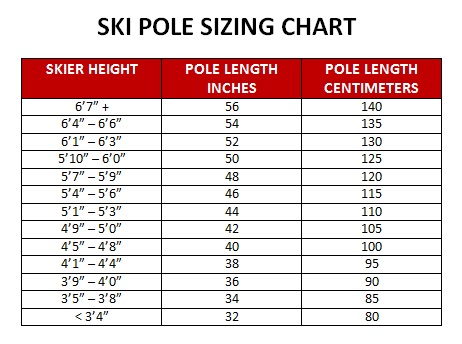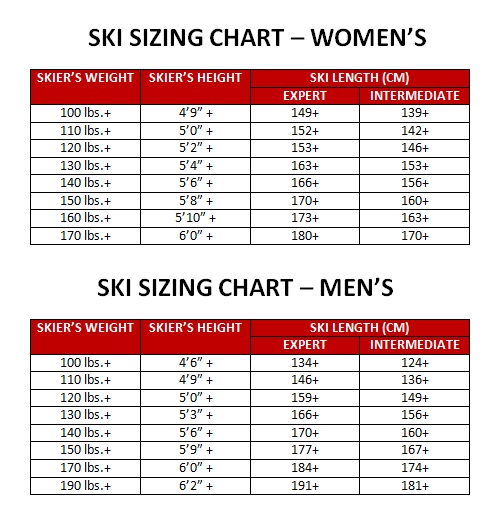Ready to carve up the mountain like a pro? Choosing the right downhill ski size is crucial for maximizing your performance and enjoyment. A properly sized ski will feel like an extension of your body, allowing you to control your descent with precision and confidence. Conversely, ill-fitting skis can lead to frustration, decreased control, and even increased risk of injury. So, let's dive into the art and science of finding your perfect pair.
Choosing the right ski length isn't just about grabbing the coolest-looking pair off the rack. It's about understanding the relationship between your body, your skiing style, and the type of terrain you plan to conquer. Factors like your height, weight, skill level, and even your skiing aspirations all play a role in determining the ideal ski size for you.
Historically, downhill skis were significantly longer, resembling wooden planks more than the high-tech equipment we see today. As ski technology advanced with the introduction of shaped skis and innovative materials, ski lengths began to shrink. This evolution allowed for greater maneuverability and control, opening up new possibilities for skiers of all levels. Understanding this evolution helps us appreciate the importance of proper sizing in the context of modern skiing.
One of the biggest issues men face when selecting downhill skis is the temptation to overestimate their skill level and choose skis that are too long or too stiff. While longer skis can offer more stability at high speeds, they can be challenging to control for less experienced skiers. This can lead to difficulty initiating turns, reduced agility, and an increased risk of falls. Choosing the right size based on your honest assessment of your abilities is paramount.
Defining the perfect ski length isn't an exact science, but rather a blend of objective factors and subjective preferences. Generally, a good starting point is to look for skis that fall somewhere between your chin and forehead when placed upright. However, this is just a rough guideline. Factors like your weight, skiing style, and preferred terrain will further refine this range.
Properly sized skis offer numerous benefits. Firstly, they enhance control and maneuverability, allowing you to navigate the slopes with ease and precision. Secondly, they improve performance by maximizing edge grip and stability, allowing you to ski faster and with more confidence. Lastly, correctly sized skis reduce the risk of injury by promoting proper technique and minimizing strain on your legs and joints.
For example, a beginner skier weighing 170 lbs and standing 5'10" might find that skis between 165cm and 175cm provide the right balance of control and maneuverability. A more advanced skier of the same height and weight, however, might prefer skis in the 175cm to 185cm range for greater stability at higher speeds.
Your action plan for finding the perfect skis should start with honest self-assessment. Be realistic about your skill level and the type of skiing you primarily enjoy. Next, research different ski types and consult with a reputable ski shop. They can help you navigate the various options and recommend skis based on your individual needs. Finally, demo different skis before making a purchase. This will give you a feel for how different lengths and styles perform on the snow.
A simple checklist includes: assessing your skill level (beginner, intermediate, advanced), determining your primary skiing style (groomers, powder, park), considering your height and weight, and researching ski types (all-mountain, powder, carving). Remember to demo skis before committing to a purchase.
Advantages and Disadvantages of Different Ski Lengths
| Ski Length | Advantages | Disadvantages |
|---|---|---|
| Shorter | Easier to maneuver, better for beginners, ideal for tight turns | Less stable at high speeds, less float in powder |
| Longer | More stable at high speeds, better float in powder, better for carving | More difficult to maneuver, less forgiving for beginners |
Five best practices for sizing skis: 1) Be honest about your skill level. 2) Consider your preferred terrain. 3) Factor in your weight. 4) Demo different skis. 5) Consult with a ski shop professional.
Five real examples: A beginner skier might choose shorter skis for easier turning. An intermediate skier might choose mid-length skis for versatility. An advanced skier might choose longer skis for stability at high speed. A powder skier might choose wider, longer skis for floatation. A park skier might choose shorter, twin-tipped skis for tricks.
Five challenges and solutions: 1) Difficulty turning on longer skis - Solution: Practice and potentially choose a shorter length. 2) Feeling unstable on shorter skis at higher speeds - Solution: Choose a slightly longer ski within your recommended range. 3) Skis feeling too stiff - Solution: Consider skis with a softer flex. 4) Skis sinking in powder - Solution: Opt for wider skis designed for powder. 5) Difficulty initiating turns - Solution: Check your technique and potentially consider shorter skis.
FAQs: 1) How do I measure my ski length? Generally, chin to forehead is a good starting point. 2) What if I’m between sizes? Consult a ski shop. 3) Do I need different skis for different terrain? Specialized skis can enhance performance. 4) How does my weight affect ski size? Heavier skiers generally need longer skis. 5) How does ski type affect sizing? Consult manufacturer recommendations. 6) What if I’m learning to ski? Start with shorter skis. 7) Can I use the same skis for all conditions? All-mountain skis offer versatility. 8) How often should I replace my skis? When they show significant wear or damage.
Tips and tricks: Demo different ski lengths and types before buying. Consult with a professional ski technician. Don't be afraid to ask questions. Consider renting skis before investing in a pair. Watch videos on proper ski technique.
Choosing the right downhill ski size is paramount for maximizing your performance, enjoyment, and safety on the slopes. By understanding the interplay between your individual characteristics and the various ski options available, you can make an informed decision that will transform your skiing experience. From conquering challenging terrain to effortlessly gliding down groomers, properly sized skis will empower you to reach your full potential. Don’t just buy skis, invest in the right skis. Hit the slopes with confidence and enjoy the thrill of a perfect run. Your ideal ski length is out there, waiting to unlock your full potential on the mountain. Don't settle for anything less than the perfect fit. Talk to experts, demo different options, and enjoy the process of finding the skis that will take your skiing to the next level. The mountains are calling – answer with confidence and the perfect pair of skis.
How To Size Backcountry Skis - Trees By Bike
Ski Pole Sizing Chart - Trees By Bike
What Size Skis For Toddler at Joseph Gibbs blog - Trees By Bike
All Mountain Ski Size Chart - Trees By Bike
Nordic Skis Size Chart - Trees By Bike
Snow Ski Size Chart - Trees By Bike
Youth Water Ski Size Chart - Trees By Bike
Youth Water Ski Size Chart - Trees By Bike
How To Size Backcountry Skis - Trees By Bike
How To Measure Downhill Ski Length at Christopher Hart blog - Trees By Bike
How to Size a Child for Downhill Skis - Trees By Bike
Downhill Ski Size Chart - Trees By Bike
Ski Pole Size Conversion Chart - Trees By Bike
How To Choose Ski Length For Kids - Trees By Bike
How To Know What Size Ski Boot You Are at John Garvey blog - Trees By Bike














